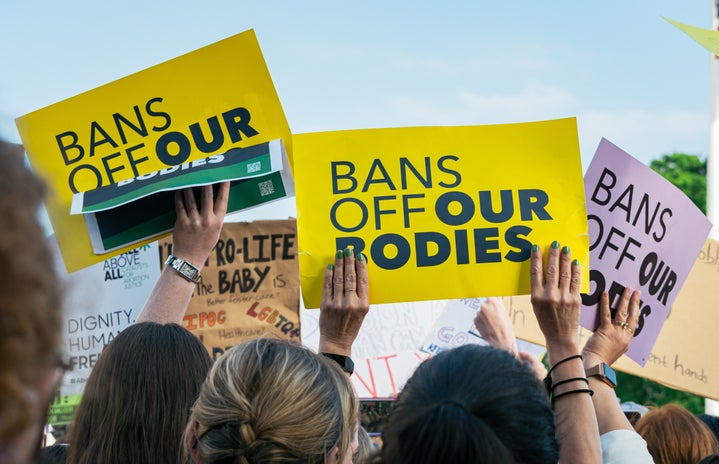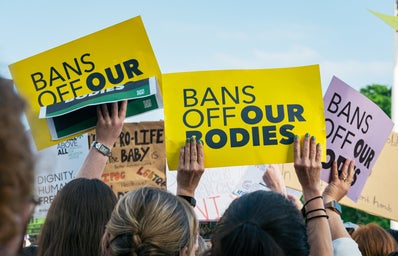On May 2, 2022, Politico released a draft majority opinion from the Supreme Court detailing their vote to overturn Roe V. Wade, the 1973 Supreme Court case that made abortion access legal in all 50 states.
Over the last few years, states have been finding loopholes in Roe v. Wade. Although abortion is legal in every state, states have been pushing bills through the Senate to restrict when abortions are still legal. For example, Texas’s Senate Bill 8 restricts abortions after a fetal heartbeat is detected – usually around six weeks.
This document is only the first draft and no final decisions have been made, but this is the first time in the country’s history where there is a strong foothold on overturning Roe v. Wade. Many states have been trying to restrict abortion access, so if the final draft from the Supreme Court — expected in about a month —reflects a similar opinion to the draft we have access to, abortion will likely become illegal in about half the country, according to the New York Times.
As we wait for a final decision from the Supreme Court, here are some important things to know.
Abortion Pill Access
In December 2021, the FDA authorized telehealth appointments to grant access to medication abortion (AKA, the abortion pill) by mail. To utilize this option, however, the recipient has to have an address in the state of the clinic / medical office they are using. Therefore, if you live in a state where abortion is banned or heavily restricted, this method of abortion is now in trouble.
This authorization was a big step in solidifying abortion access regardless of the restrictions put into place in certain states. With Roe under attack, the next thing that governors will work to restrict are all the workarounds that doctors and those in need of an abortion use to make the pill accessable by mail.
The abortion pill can still be made available at most Planned Parenthood health centers, or health clinics.
Sex Education
According to The Guttmacher Institute, “Most women getting abortions are living in poverty or on lower incomes.” What’s even scarier is that the loss of abortion access could put other forms of reproductive health care – such as birth control and affordable clinic access – at risk.
Sex education in the US is already poor; according to The Guttmacher Institute, only 39 of the 50 states require sex and HIV education. Only nine states require that said sex and HIV education be “appropriate for a student’s cultural background and … not biased against any race, sex or ethnicity.” Therefore, because of the horrific systemic racism in this country, those who are receiving improper sex education are most likely students of color because they are the Americans living in poorer, less-educated communities. Those students in “red” or conservative-led states or counties are also getting jipped in their sex education due to religious biases and the level of “inappropriateness” when it comes to learning about sex.
You can’t stop young people from having sex, no matter what ideals are pushed onto them. So, how can we expect them to practice safe sex if they don’t know what their resources are?
If Roe v. Wade is overturned, there needs to be a big shift in the country’s sex education requirements. Young people can be educated at a young age how to practice safe sex and take all precautions possible to avoid potential pregnancy. Students should know which doctors or health clinics (like Planned Parenthood) are available to them for contraception and reproductive health care, and educational institutions should be able to provide that information for them.
The States At Risk
According to the New York Times, there are a total of 28 states likely to ban or restrict abortion if Roe v. Wade is overturned. And 13 of them are likely to completely outlaw abortion “immediately or very quickly:” Idaho, Utah, Wyoming, North Dakota, South Dakota, Texas, Oklahoma, Missouri, Arkansas, Louisiana, Mississippi, Tennessee, and Kentucky.
These states will most likely restrict abortion access before fetal viability (about 23-24 weeks into pregnancy), if not completely: Arizona, Montana, Nebraska, Iowa, Indiana, Alabama, Georgia, Florida, South Carolina, West Virginia, and Ohio.
There are four states – Wisconsin, Michigan, Kansas, and North Carolina – that had abortion bans in place before Roe v. Wade but now have Democratic and pro-choice governors, so they are up in the air.
If all 28 of these states put a new restriction on abortion, that leaves 22 states where abortion will still be legal. However, those with a uterus who don’t live in one of these 22 states will still have unavoidable barriers in the way of their right to a legal abortion, such as “financial resources, time off work and child care.” Many of those who end up needing abortions live in poverty or in less-educated, rural communities, so they can’t travel to another state to get an abortion.
If Americans don’t have access to legal abortions, they could turn to dangerous alternative methods of ending a pregnancy. Abortions are medical procedures and should be advised by a medical professional so that the patient is not put at risk. Taking matters into their own hands could lead to deaths of living, breathing, existing people.
Abortion rights belong to those with a uterus. It’s horrifying that this is the state that our country is in, especially for those who don’t live in a state whose leaders believe that the right to one’s body is their own. The fight cannot stop. Reproductive rights belong to the people, not the government.


